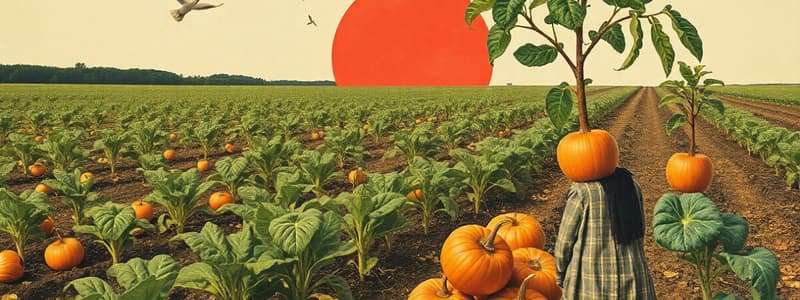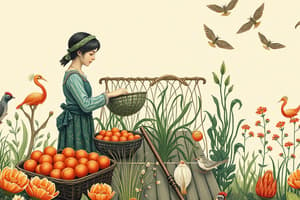Podcast
Questions and Answers
Which type of food production focuses on cultivating plants for consumption?
Which type of food production focuses on cultivating plants for consumption?
- Livestock Farming
- Aquaculture
- Horticulture (correct)
- Conventional Farming
Sustainable agriculture focuses solely on economic profitability.
Sustainable agriculture focuses solely on economic profitability.
False (B)
What is the term for the state when all people have sufficient access to safe and nutritious food?
What is the term for the state when all people have sufficient access to safe and nutritious food?
Food Security
The practice of growing crops in stacked layers is known as __________.
The practice of growing crops in stacked layers is known as __________.
Match the following farming methods with their characteristics:
Match the following farming methods with their characteristics:
Which of the following is a challenge affecting food production?
Which of the following is a challenge affecting food production?
Agroecology integrates ecological principles into agricultural practices.
Agroecology integrates ecological principles into agricultural practices.
What is the term for the farming of fish and other aquatic organisms?
What is the term for the farming of fish and other aquatic organisms?
Flashcards are hidden until you start studying
Study Notes
Overview of Food Production
- Definition: The process of cultivating plants and raising animals for consumption.
- Importance: Essential for food security, economic stability, and sustainability.
Types of Food Production
-
Agriculture:
- Crop Production: Cultivation of grains, fruits, vegetables, etc.
- Livestock Farming: Raising animals like cattle, pigs, poultry for meat, milk, and eggs.
-
Aquaculture:
- Farming of fish and other aquatic organisms in controlled environments.
-
Horticulture:
- Cultivation of garden crops, including fruits, vegetables, nuts, seeds, herbs, mushrooms, algae, flowers, seaweeds, and non-food crops.
Methods of Food Production
- Conventional Farming: Use of synthetic fertilizers and pesticides; larger scale.
- Organic Farming: Uses natural processes and materials; no synthetic chemicals.
- Sustainable Agriculture: Focus on environmental health, economic profitability, and social equity.
- Permaculture: Design principles that replicate natural ecosystems for food production.
Key Concepts
- Food Chain: The sequence of processes by which food is produced, processed, and consumed.
- Food Security: The state when all people have physical, social, and economic access to sufficient, safe, and nutritious food.
- Agroecology: Integrates ecological principles into agricultural practices to enhance sustainability.
Challenges in Food Production
- Climate Change: Alters weather patterns, affecting crop yields.
- Urbanization: Reduces available farmland and increases demand for food.
- Water Scarcity: Limited water resources impact irrigation and livestock.
- Soil Degradation: Loss of soil fertility and health due to unsustainable practices.
Innovations in Food Production
- Biotechnology: Genetically modified organisms (GMOs) to enhance yield and resistance.
- Precision Agriculture: Use of technology (drones, sensors) to optimize farming practices.
- Vertical Farming: Growing crops in stacked layers, often in urban settings.
Sustainable Practices
- Crop Rotation: Alternating crops in a field to improve soil health.
- Agroforestry: Integrating trees and shrubs into agricultural lands.
- Integrated Pest Management (IPM): Combining biological, cultural, and chemical practices for pest control.
Global Impact
- Food production affects global trade, economies, and diets.
- The sector is a major contributor to greenhouse gas emissions and biodiversity loss.
Future Trends
- Increased focus on plant-based diets for sustainability.
- Advancements in food technology, such as lab-grown meat and alternative proteins.
Overview of Food Production
- Food production involves cultivating plants and raising animals for human consumption.
- It plays a crucial role in ensuring food security, economic stability, and sustainable practices.
Types of Food Production
- Agriculture includes:
- Crop Production: Involves growing grains, fruits, and vegetables.
- Livestock Farming: Encompasses raising animals like cattle, pigs, and poultry for meat, milk, and eggs.
- Aquaculture refers to the controlled farming of fish and other aquatic organisms.
- Horticulture is the cultivation of garden crops such as fruits, vegetables, nuts, herbs, and flowers, as well as non-food crops.
Methods of Food Production
- Conventional Farming utilizes synthetic fertilizers and pesticides for larger scale production.
- Organic Farming relies on natural processes without synthetic chemicals.
- Sustainable Agriculture emphasizes environmental health, economic viability, and social equity.
- Permaculture implements design principles that mimic natural ecosystems to enhance food production.
Key Concepts
- The Food Chain represents the sequence of production, processing, and consumption of food.
- Food Security ensures that all individuals have access to sufficient, safe, and nutritious food.
- Agroecology incorporates ecological principles into farming practices to improve sustainability.
Challenges in Food Production
- Climate Change disrupts weather patterns, which can lead to reduced crop yields.
- Urbanization decreases available farmland while increasing food demand.
- Water Scarcity limits irrigation capabilities and affects livestock management.
- Soil Degradation results in diminished soil fertility due to unsustainable agricultural practices.
Innovations in Food Production
- Biotechnology employs genetically modified organisms (GMOs) to improve crop yield and resistance to pests and diseases.
- Precision Agriculture leverages technology, including drones and sensors, to enhance farming efficiency.
- Vertical Farming enables crop cultivation in stacked layers, suitable for urban environments.
Sustainable Practices
- Crop Rotation helps maintain soil health by alternating different crops in the same field.
- Agroforestry promotes the integration of trees and shrubs into farming systems for better productivity and biodiversity.
- Integrated Pest Management (IPM) combines various pest control strategies, including biological and cultural practices, to minimize chemical usage.
Global Impact
- Food production significantly influences global trade, economies, and dietary habits.
- The agricultural sector contributes substantially to greenhouse gas emissions and biodiversity decline.
Future Trends
- A shift toward plant-based diets is anticipated to promote sustainability in food consumption.
- Continuous advancements in food technology, such as lab-grown meat and alternative proteins, are expected to shape future food systems.
Studying That Suits You
Use AI to generate personalized quizzes and flashcards to suit your learning preferences.




